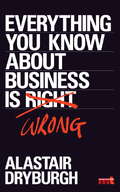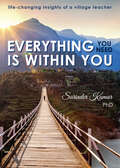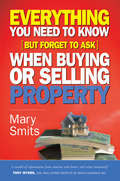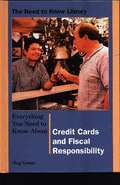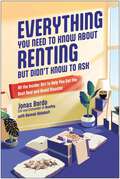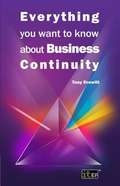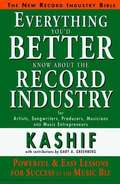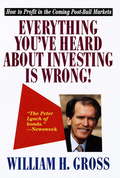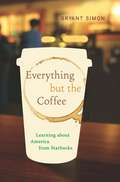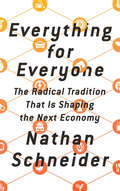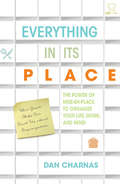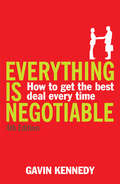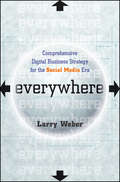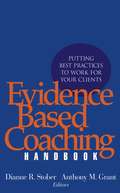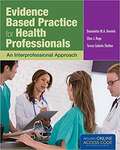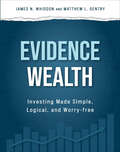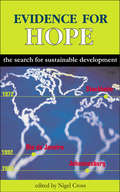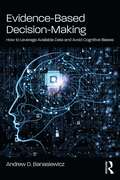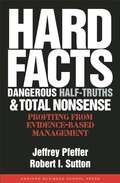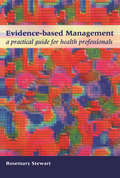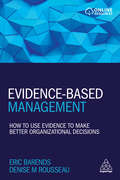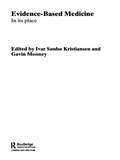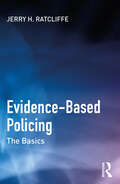- Table View
- List View
Everything You Know About Business is Wrong: How to unstick your thinking and upgrade your rules of thumb
by Alastair DryburghTo be brilliant in business you have to dare to be different. It means going against the grain, taking risks and never giving up despite the challenges hurled at you. EVERYTHING YOU KNOW ABOUT BUSINESS IS WRONG is the bible for the unconventional business brain who won't accept anything but excellence. Based on the ideas in the author's pithy column 'Don't You Believe It' for Management Today, Alastair Dryburgh takes modern business myths and blows them apart. Did you know that: Cost cutting is a bad way to boost profits? That you shouldn't always give 110%? Incentives don't encourage people to do useful things? So much of what we learn about business is plain wrong. It's time to challenge your assumptions and learn about the things that will help you be successful.
Everything You Need Is Within You
by Surinder KumarWhen Surinder Kumar was growing up in post-partition India, his father, Kanshi Ram Arora, was known as "Master Ji," or "respected teacher." In the years that followed Britain's departure and the challenges that faced a newly reconstructed nation, Kanshi Ram helped his village grow out of poverty and deprivation. He did this by imbuing his family and his community with a set of principles that set many of them on a path to success beyond their wildest dreams. Today, Surinder Kumar is an enormously successful businessperson, having served prominent roles with Wrigley, PepsiCo, and Unilever. He ties his accomplishments directly to the principles he learned from his father as a child – principles he believes apply to everyone. Now, Surinder brings the lessons of Master Ji to you in this powerful and inspiring book. Through sixteen brief chapters brimming with universal advice, he offers you the teachings that took him from the depths of poverty to a life of great professional and personal accomplishment. Filled with exercises and practical applications, Everything You Need Is Within You is a treasure of a book that will resonate within you and the generations to come.
Everything You Need to Know (But Forget to Ask) When Buying or Selling Property
by Mary SmitsWhen it comes to buying and selling real estate, knowledge is power -- and this book lets you in on the secrets. Everything You Need to Know (But Forget to Ask) When Buying or Selling Property is a concise, authoritative guide. In plain, simple language, real estate agent Mary Smits looks at the many issues that confront both buyers and sellers, including: choosing a home or investment property wisely negotiating to save money understanding the paperwork dealing with and choosing real estate agents preparing to sell your property moving home. Mary explains how to search for property on the internet and provides tips to help you use buying and selling tactics to your advantage and avoid potential traps. The book features useful check lists to take with you to inspections, along with sound, practical advice.
Everything You Need to Know About Credit Cards and Fiscal Responsibility (Need to Know Library)
by Meg GreenIn this handy guide, you will learn about credit cards, what all that fine print mumbo jumbo means, and how to use one without getting into trouble or debt.
Everything You Need to Know About Renting But Didn't Know to Ask: All the Insider Dirt to Help You Get the Best Deal and Avoid Disaster
by Jonas Bordo Hannah HildeboltThe rental process is complicated, but your journey to finding a home doesn&’t have to be dominated by confusion and frustration. Everything You Need to Know about Renting but Didn&’t Know to Ask gives you the information and confidence you need to seek, secure, and flourish in your new home. With more than 20 years of experience in the rental industry as a renter, landlord, property manager, and now founder of Dwellsy, the largest US rental marketplace, Jonas Bordo has compiled a comprehensive and practical guide to help you: Prepare for the rental search Find the best place for you Avoid scams Succeed in the application process and get the place you want Make the most of your new home Get your security deposit back when you leave your rental Whether you&’re a first-time renter or hoping to make your next rental process smoother than the last, Everything You Need to Know about Renting but Didn&’t Know to Ask will help you navigate the entire process. You&’ll find tips on determining your price range, touring options in person or from afar, negotiating your lease, bringing your pet with you, moving in and moving out, being a good neighbor, and much more. With this book as your companion, eliminate surprises and leave frustration behind as you find your next home with confidence and ease.
Everything You Want to Know About Business Continuity
by Tony DrewittBusiness continuity is crucial to the survival of your business. Learn how to manage it effectively.
Everything You'd Better Know About The Record Industry
by Kashif Gary A. GreenbergFor everyone from the serious musician to parents who have kids that have an interest in becoming professionals in the record industry. It's easy to read and understand. Written to give producers, artists, performers, and music entrepreneurs an inspiring view into the way things should be done in the record industry. Everything You'd Better Know About the Record Industry is about how to find success in the music business and how to make money doing it. It answers all the questions one would have about making it, but more importantly, its answers questions about the record industry that you don't even know to ask.
Everything You've Heard About Investing Is Wrong!
by Bill GrossOne of today's best money managers heralds the onset of a new financial era, in which the rules for investors will be dramatically different. With wit and humor, Gross details recommended strategies, revealing where the markets are headed--and how to ride them to success.
Everything but the Coffee: Learning about America from Starbucks
by Bryant SimonEverything but the Coffee casts a fresh eye on the world's most famous coffee company, looking beyond baristas, movie cameos, and Paul McCartney CDs to understand what Starbucks can tell us about America. Bryant Simon visited hundreds of Starbucks around the world to ask, Why did Starbucks take hold so quickly with consumers? What did it seem to provide over and above a decent cup of coffee? Why at the moment of Starbucks' profit-generating peak did the company lose its way, leaving observers baffled about how it might regain its customers and its cultural significance? Everything but the Coffee probes the company's psychological, emotional, political, and sociological power to discover how Starbucks' explosive success and rapid deflation exemplify American culture at this historical moment. Most importantly, it shows that Starbucks speaks to a deeply felt American need for predictability and class standing, community and authenticity, revealing that Starbucks' appeal lies not in the product it sells but in the easily consumed identity it offers.
Everything for Everyone: The Radical Tradition That Is Shaping the Next Economy
by Nathan SchneiderThe origins of the next radical economy is rooted in a tradition that has empowered people for centuries and is now making a comeback.A new feudalism is on the rise. While monopolistic corporations feed their spoils to the rich, more and more of us are expected to live gig to gig. But, as Nathan Schneider shows, an alternative to the robber-baron economy is hiding in plain sight; we just need to know where to look.Cooperatives are jointly owned, democratically controlled enterprises that advance the economic, social, and cultural interests of their members. They often emerge during moments of crisis not unlike our own, putting people in charge of the workplaces, credit unions, grocery stores, healthcare, and utilities they depend on.Everything for Everyone chronicles this revolution--from taxi cooperatives keeping Uber at bay, to an outspoken mayor transforming his city in the Deep South, to a fugitive building a fairer version of Bitcoin, to the rural electric co-op members who are propelling an aging system into the future. As these pioneers show, co-ops are helping us rediscover our capacity for creative, powerful, and fair democracy.
Everything for Sale: The Virtues and Limits of Markets
by Robert KuttnerThere's a battle raging inside and outside the halls of Congress for the economic hearts and minds of America. "Reduce the size of big government! Less regulation! Privatization! Market economy!"
Everything in Its Place: The Power of Mise-En-Place to Organize Your Life, Work, and Mind
by Dan CharnasAn organizational book inspired by the culinary world: how to take the principles of mise-en-place out of your kitchen and into your life.Every day, chefs across the globe churn out enormous amounts of high-quality work with efficiency using a system called mise-en-place—a French culinary term that means “putting in place” and signifies an entire lifestyle of readiness and engagement. In Everything in Its Place, Dan Charnas reveals how to apply mise-en-place outside the kitchen, in any kind of work. Culled from dozens of interviews with culinary professionals and executives, including world-renowned chefs like Thomas Keller and Alfred Portale, this essential guide offers a simple system to focus your actions and accomplish your work. Charnas spells out the 10 major principles of mise-en-place for chefs and non-chefs alike: (1) planning is prime; (2) arranging spaces and perfecting movements; (3) cleaning as you go; (4) making first moves; (5) finishing actions; (6) slowing down to speed up; (7) call and callback; (8) open ears and eyes; (9) inspect and correct; (10) total utilization. This journey into the world of chefs and cooks shows you how each principle works in the kitchen, office, home, and virtually any other setting.
Everything is Negotiable: 4th Edition
by Gavin KennedyWhether you need to ask for a raise at work, request a better hotel room while you're on holiday, or even debate with your stubborn teenager at home, you can learn effective and powerful negotiation skills to help you get the best deal every time.In this fully revised and updated fourth edition of the worldwide success Everything is Negotiable, expert negotiator Gavin Kennedy walks you through all the techniques and tricks you need to get the best deal in any situation. With chapters on such subjects as making your offer count, dealing with intimidation and getting it in writing, as well as self-assessment tests to help chart your progress, Everything is Negotiable is a one-stop shop for anyone who wants to improve their negotiation skills. Superbly practical and insightful, this essential guide will make sure you come out top in any negotiation.
Everywhere
by Larry WeberPut digital business strategy at the center of your business Welcome to the social media age. Although its impact was first felt in the marketing department, the social web is spreading across all business functions, impacting the way they communicate, operate, organize, and create value. A comprehensive digital strategy is essential for businesses hoping to build this new form of competitive advantage. Everywhere explains how to put your digital strategy at the center of how your organization communicates, operates, organizes itself, and creates value. Develop a comprehensive digital strategy for your organization Put your online business strategy at the center of your customer's experience, and at the heart of everything you do Larry Weber's W2 Group is helping companies like Sony, IBM, Harvard Pilgrim Health Care, and the government of Rwanda, craft new online business strategies The Web is not just another marketing channel. Put social media, email, Web, and other digital interactions Everywhere in your business, and make digital business strategy the heart of your thriving enterprise.
Evidence Based Coaching Handbook
by Grant Anthony M. Stober Dianne R.The first reference to bring scientifically proven approaches to the practice of personal and executive coaching The Evidence Based Coaching Handbook applies recent behavioral science research to executive and personal coaching, bringing multiple disciplines to bear on why and how coaching works. A groundbreaking resource for this burgeoning profession, this text presents several different coaching approaches along with the empirical and theoretical knowledge base supporting each. Recognizing the special character of coaching-that the coaching process is non-medical, collaborative, and highly contextual-the authors lay out an evidence-based coaching model that allows practitioners to integrate their own expertise and the needs of their individual clients with the best current knowledge. This gives coaches the ability to better understand and optimize their own coaching interventions, while not having to conform to a single, rigidly defined practice standard. The Evidence Based Coaching Handbook looks at various approaches and applies each to the same two case studies, demonstrating through this practical comparison the methods, assumptions, and concepts at work in the different approaches. The coverage includes: An overview: a contextual model of coaching approaches Systems and complexity theory The behavioral perspective The humanistic perspective Cognitive coaching Adult development theory An integrative, goal-focused approach Psychoanalytically informed coaching Positive psychology An adult learning approach An adventure-based framework Culture and coaching
Evidence Based Practice for Health Professionals
by Bernadette Howlett Ellen RogoEvidence Based Practice for Health Professionals is included in the 2015 edition of the essential collection of Doody’s Core Titles. Evidence based practice (EBP) has become the standard in health care practice today. Evidence Based Practice for Health Professionals covers the fundamentals of applying medical evidence to clinical practice and discussing research findings with patients and fellow professionals. This essential text explains the basic concepts of EBP, its applications in health care, and how to interpret biostatistics and biomedical research. With examples derived from multiple health professions, Evidence Based Practice for Health Professionals teaches the skills needed to access and interpret research in order to successfully apply it to collaborative, patient-centered health care decisions. Students gain valuable practice with skill-building learning activities, such as explaining the evidence for treatments to patients, developing a standard of care, selecting a diagnostic tool, and designing community-based educational materials. Evidence-Based Practice for Health Professionals also helps prepare students to communicate knowledgeably with members of interprofessional healthcare teams as well as with pharmaceutical sales representatives. <P><P> • Covers EBP fundamentals and their application to clinical practice • Teaches the skills needed to interpret medical research and apply it to patient care • Enables students to develop EBP skills with practical learning activities • Prepares students to communicate about medical evidence with patients and fellow professionals INSTRUCTOR RESOURCES • Instructor’s Manual • PowerPoint Presentations • Test Bank • Handouts Student Resources: Companion Website* *Each new copy of the textbook includes an access code for the Companion Website. Please note electronic formats/eBooks do not include access to the Companion Website.
Evidence Wealth: Investing Made Simple, Logical, and Worry-free
by James N WhiddonEveryone knows that human beings can't predict the future. Yet, Wall Street and its minions maintain otherwise with their "latest and greatest secrets," which result in confusion, hit-or-miss approaches, and exaggerated return claims. This can be very frustrating for any investor. We'll take you "behind the curtain" to expose the tricks of the investing trade so you won't fall victim. Then the good news . . . Evidence Wealth changes everything. We'll show how, as a free-market participant, you can have a successful investing experience through Evidence-Based Investing (EBI). This approach uses a Nobel Prize-winning, data-driven methodology to create the optimal investing framework. Then once this financial piece is in order, you can focus more on those things that bring true wealth into your life: investing wisely of your time, talents, and relationships. Congratulations! The next few hours are going to make a significant impact in your life as you discover the only investment strategy you will ever need.
Evidence for Hope: The Search for Sustainable Development
by Nigel CrossSince the Stockholm Environment Conference in 1972 and the Rio Summit in 1992, there has been unprecedented public concern for the future of the planet and a growing awareness that development needs to be sustainable. This text charts the growth of these ideas by beginning with a visionary piece written by Barbara Ward in the 1970s, and ends with a chapter looking ahead another 30 years into the future. Two generations of thinkers and activists have helped to shape environment and development policy and increase local level power in environmental management. In celebration of their 30th anniversary, the IIED's most influential writers provide in this volume a perspective on three decades of development and green debates.
Evidence-Based Decision-Making: How to Leverage Available Data and Avoid Cognitive Biases
by Andrew D. BanasiewiczEvidence-Based Decision-Making: How to Leverage Available Data and Avoid Cognitive Biases examines how a wide range of factual evidence, primarily derived from a variety of data available to organizations, can be used to improve the quality of business decision-making, by helping decision makers circumvent the various cognitive biases that adversely impact how we all think. The book is built on the following premise: During the past decade, the new ‘data world’ emerged, in which the rush to develop competencies around business analytics and data science can be characterized as nothing less than the new commercial arms race. The ever-expanding volume and variety of data are well known, as are the great advances in data processing/analytics, data visualization, and related information production-focused capabilities. Yet, comparatively little effort has been devoted to how the informational products of business analytics and data science are ‘consumed’ or used in the organizational decision-making processes, as the available evidence shows that only some of that information is used to drive some business decisions some of the time. Evidence-Based Decision-Making details an explicit process describing how the universe of available and applicable evidence, which includes organizational and other data, industry benchmarks, scientific studies, and professional experience, can be assessed, amalgamated, and funneled into an objective driver of key business decisions. Introducing key concepts in relation to data and evidence, and the history of evidence-based management, this new and extremely topical book will be essential reading for researchers and students of data analytics as well as those working in the private and public sectors, and in the voluntary sector.
Evidence-Based Management: A Practical Guide for Health Professionals
by Rosemary StewartThe NHS pension scheme is the largest in Europe. This guide explains how it works and how to maximize its benefits and avoid its pitfalls. The book covers: recent changes to the scheme including new provisions for early retirement; personal pensions, financial planning and investment options; advice on preparing for retirement and working after retirement; state benefits; and health and leisure in retirement. It is written for all NHS staff and should be of particular value to GPs and salaried doctors.
Evidence-Based Management: How to Use Evidence to Make Better Organizational Decisions (Oxford Library Of Psychology)
by Denise M. Rousseau Eric BarendsDecisions in businesses and organizations are too often based on fads, fashions and the success stories of famous CEOs. At the same time, traditional models and new cutting-edge solutions often fail to deliver on what they promise. This situation leaves managers, business leaders, consultants and policymakers with a profound challenge: how can we stay away from trends and quick fixes, and instead use valid and reliable evidence to support the organization?In response to this problem, evidence-based management has evolved with the goal of improving the quality of decision-making by using critically evaluated evidence from multiple sources - organizational data, professional expertise, stakeholder values and scientific literature. This book sets out and explains the specific skills needed to gather, understand and use evidence to make better-informed organizational decisions.Evidence-Based Management is a comprehensive guide that provides current and future managers, consultants and organizational leaders with the knowledge and practical skills to improve the quality and outcome of their decision-making. Online resources include case studies, exercises, lecture slides and further reading.
Evidence-Based Medicine: In Its Place (Routledge International Studies In Health Economics Ser. #Vol. 3)
by Gavin Mooney Ivar Sønbø KristiansenEvidence-based medicine is defined as the conscientious explicit and judicious use of current best evidence in making decisions about the care of individual patients. This superb collection will take a critical view of this concept and examine the economic implications of its imposition.
Evidence-Based Policing: The Basics
by Jerry H. RatcliffeWhat is evidence-based policing and how is it done? This book provides an answer to both questions, offering an introduction for undergraduate students and a hands-on guide for police officers wanting to know how to put principles into practice. It serves as a gentle introduction to the terminology, ideas, and scientific methods associated with evidence-based policy, and outlines some of the existing policing applications. A couple of introductory chapters summarize evidence-based policy and its goals and origins. The core of the book eases the reader through a range of practical chapters that answer questions many people have about evidence-based practice in policing. What does good science look like? How do I find reliable research? How do I evaluate research? What is a hypothesis? How do randomized experiments work? These chapters not only provide a practical guide to reading and using existing research, but also a roadmap for readers wanting to start their own research project. The final chapters outline different ways to publish research, discuss concerns around evidence-based policing, and ask what is in the future for this emerging field. Annotated with the author’s own experiences as a police officer and researcher, and filled with simple aids, flowcharts, and figures, this practical guide is the most accessible introduction to evidence-based policing available. It is essential reading for policing students and police professionals alike. Further resources are available on the book’s website at evidencebasedpolicing.net.
Evidence-Based Policing: The Basics
by Jerry H. RatcliffeWhat is evidence-based policing and how is it done? This book provides an answer to both questions, offering an introduction for undergraduate students and a hands-on guide for police officers wanting to know how to put principles into practice. It serves as a gentle introduction to the terminology, ideas, and scientific methods associated with evidence-based policy, and outlines some of the existing policing applications. A couple of introductory chapters summarize evidence-based policy and its goals and origins. The core of the book eases the reader through a range of practical chapters that answer questions many people have about evidence-based practice in policing. What does good science look like? How do I find reliable research? How do I evaluate research? What is a hypothesis? How do randomized experiments work? These chapters not only provide a practical guide to reading and using existing research, but also a roadmap for readers wanting to start their own research project. The final chapters outline different ways to publish research, discuss concerns around evidence-based policing, and ask what is in the future for this emerging field. Annotated with the author’s own experiences as a police officer and researcher, and filled with simple aids, flowcharts, and figures, this practical guide is the most accessible introduction to evidence-based policing available. It is essential reading for policing students and police professionals alike. Further resources are available on the book’s website at evidencebasedpolicing.net.
